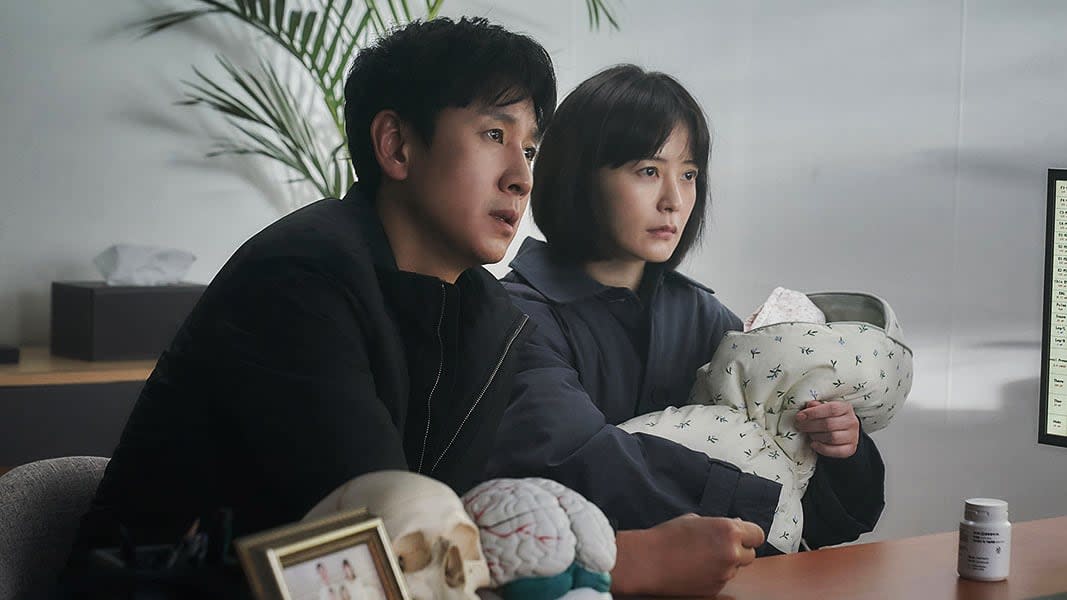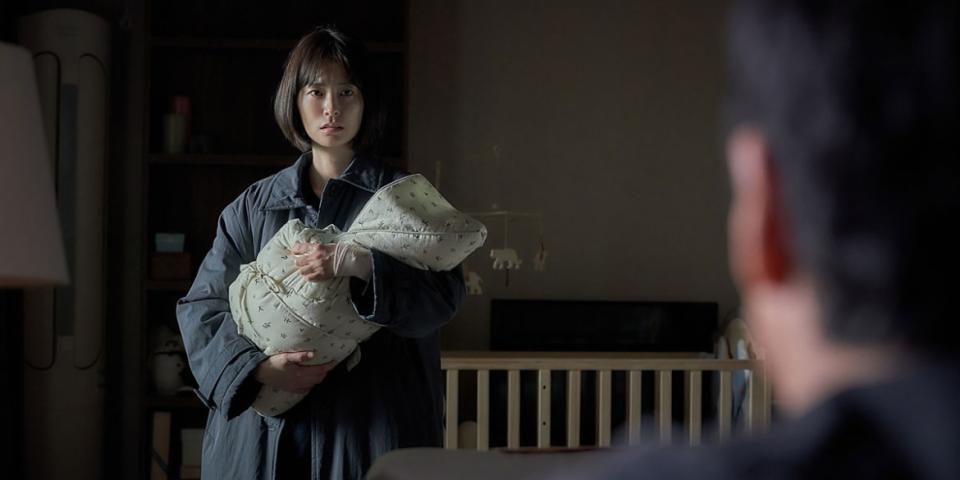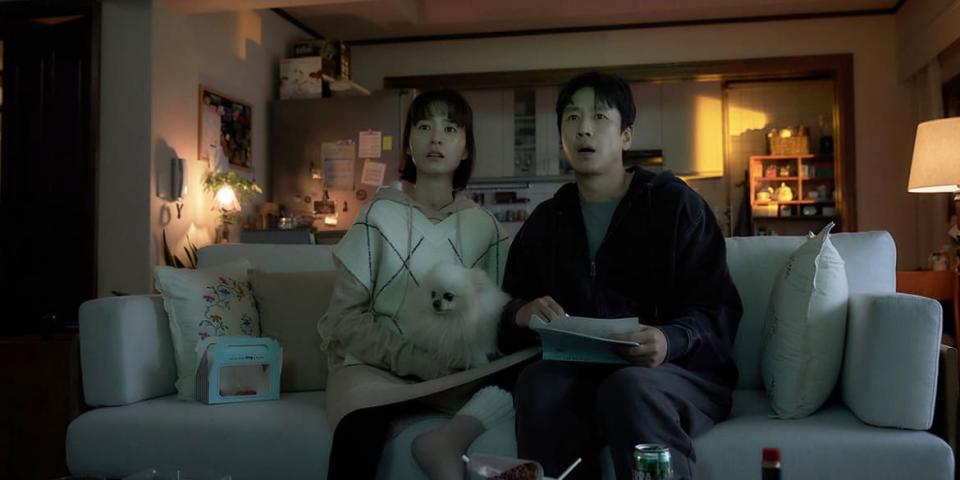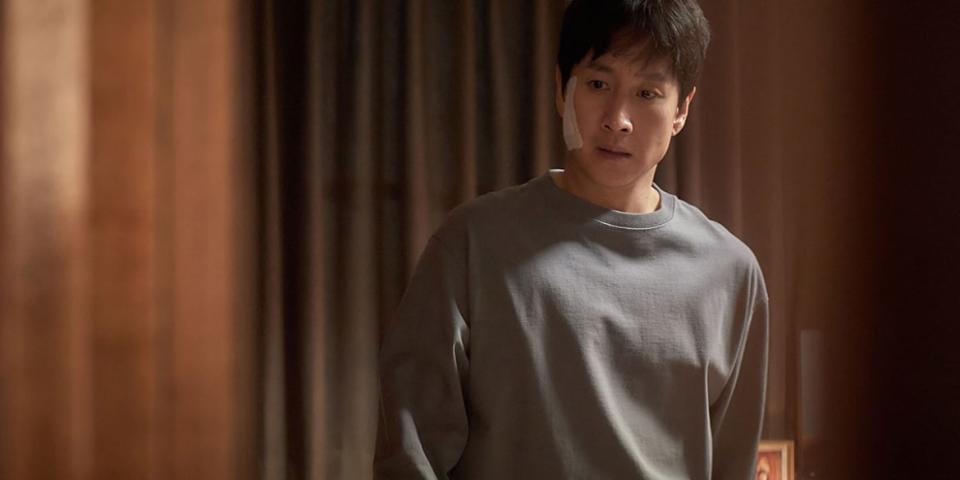‘Sleep’ Is a Horror Movie Nightmare—in the Best Way

A Nightmare on Elm Street imagined sleep as a vulnerable and dangerous state of semi-consciousness where our worst fears come to malevolent life. Sleep, Jason Yu’s chilling genre feature, takes that notion and wields it for inventive terror and comedy. The story of a young couple dealing with nocturnal behavior and phenomena of a perplexing and petrifying sort, it’s a directorial debut of poised peril that should inspire both laughs and a few sleepless nights following its North American premiere at this year’s Toronto International Film Festival.
South Korean director Yu proves himself extremely comfortable behind the camera with Sleep, if not quite as snug as Hyun-su (Parasite’s Lee Sun-kyun) is when lying in bed beside his pregnant wife Soo-jin (Jung Yu-mi). Nonetheless, it’s Soo-jin’s snores that open the film, interrupted by the discovery of her husband sitting upright in the dark. “Something’s inside,” he mutters before falling backwards into an unshakable slumber, leaving Soo-jin to investigate the ominous loud noises coming from somewhere in their cozy apartment.
The source of that banging is almost as mysterious as the fact that Hyun-su isn’t disturbed by it. It is, however, plenty bothersome to the couple’s fluffy Pomeranian Pepper as well as the building’s new downstairs tenant and her son, who aren’t shy about complaining about the constant clamor emanating from Hyun-su and Soo-jin’s residence—a problem that also, apparently, bugged their prior neighbor, whose grouchy and creepy conduct is routinely mocked by Hyun-su and Soo-jin.
Unfortunately for the newlyweds, whose wedding portrait boasts Pepper on their laps, peace and quiet is not in their immediate future. “Together we can overcome anything,” reads a plaque adorning their living room wall. Soo-Jin fervently believes it, even once her spouse begins exhibiting unsettling behavior. While in deep sleep, Hyun-su—a somewhat successful actor trying to keep his career afloat—responds to cheek and neck itchiness with excessive violence, thereby costing him his current gig. Hyun-su doesn’t remember any of this somnambulant craziness, but with the evidence literally staring him in the face, he concedes that something must be done. Soo-jin wants him to seek professional treatment (leading to his amusing reply, “Wait, which doctor should I see?”) and quickly takes matters into her own hands by bringing him to a clinic where an expert explains that Hyun-su is suffering from an REM disorder and then hands them a brochure whose illustrations exactly mirror their experiences.

Yu shoots Sleep with silky portent, his camera teasing and concealing monstrous sights and forces just outside the frame, so it’s no surprise when talk about the supernatural materializes, first courtesy of Soo-Jin’s understandably worried mom. Soo-Jin initially wants nothing to do with her mother’s old-world superstitions nor her favorite kooky shaman, and she certainly doesn’t care about the bujeok (i.e., charmed talisman papers) she’s told to hide around the home as a way to ward off evil spirits. Still, with modern medicine—be it pills or the doctor’s advice to avoid booze and safeguard the apartment with doorbells and padlocks—failing to prevent tragedy, Soo-jin grows increasingly distressed. That desperation only mounts once she delivers their child, who instantly becomes the family member most at risk from Hyun-su’s sleepwalking exploits.
Split into three chapters, Sleep drums up tension via Yu’s sinister stewardship and confined setting. Taking place largely in Hyun-su and Soo-jin’s apartment, the action’s claustrophobia builds methodically, with each successive incident providing the wife and new mother with additional logistical dilemmas regarding how to keep Hyun-su from doing the insane and unthinkable once he chooses to get 40 winks. Eyes are a recurring motif throughout, with the director fixating most intently on Soo-jin’s retinas to gauge—and convey—her suspicion, anger and despair. Jung Yu-mi’s performance assuredly straddles the line between serious and jokey, her character’s reasonable alarm offset by her staunch belief that nothing can destroy her marriage so long as she and Hyun-su remain united—and, additionally, that no matter their troubles, “We’re not a dysfunctional family!”

Protestations to the contrary, Soo-jin and Hyun-su aren’t operating at peak marital capacity, and Sleep playfully maintains intrigue by refusing, until its finale, to reveal whether the pair’s predicament is a result of the paranormal or the psychological. Upon losing his latest role, Hyun-su wants to quit acting altogether, and that cut-and-run attitude (which Soo-jin rejects) suggests that perhaps his condition is the byproduct of marital and parental anxieties he wants to flee. Such suspicions are underscored by his initial enigmatic utterance, “Something’s inside,” which could refer to their flat, their unborn child, or his own creeping doubts. Yu hints at multiple explanations in order to keep audiences on their toes, all while ratcheting up the lunacy, which soon drives Hyun-su to take drastic measures to constrain himself, none of which permanently do the trick.
Encased in near-perpetual gloom, the better to amplify its unreal mood, Sleep leaps forward in time for its final section, whose “definitive” revelations arrive only during the closing minutes. Ultimately, though, everything is up for debate, and moreover, conclusiveness is largely beside the point. Like its protagonist, Yu’s efficient script operates in that hazy gray area between the concrete and the intangible. It toys with sight and blindness, reality and fantasy, waking and dreaming, protectiveness and menace with a confident hand. Additionally, it’s aided by solid turns from both Jung Yu-mi as a woman torn between loyalty and distrust, and Lee Sun-kyun as a man who doesn’t know how to keep himself from being a potential monster (to himself, and others)—largely because he’s incapable of comprehending the nature of his thoughts, feelings and actions.

Hyun-su and Soo-jin may not think their ordeal is very funny—especially once it inspires escalating maternal mania—but Sleep shrewdly augments its unease by indulging in bleakly goofy humor. Nods to more than a couple of horror classics (including The Shining) confirm that Yu has studied at the feet of his illustrious predecessors, even as he demonstrates a distinctively dark, demented touch all his own. Infused with pulse-pounding paranoia and tantalizing ambiguity, it’s an impressive debut on which no genre fan should, ahem, sleep.
Liked this review? Sign up to get our weekly See Skip newsletter every Tuesday and find out what new shows and movies are worth watching, and which aren’t.
Get the Daily Beast's biggest scoops and scandals delivered right to your inbox. Sign up now.
Stay informed and gain unlimited access to the Daily Beast's unmatched reporting. Subscribe now.

